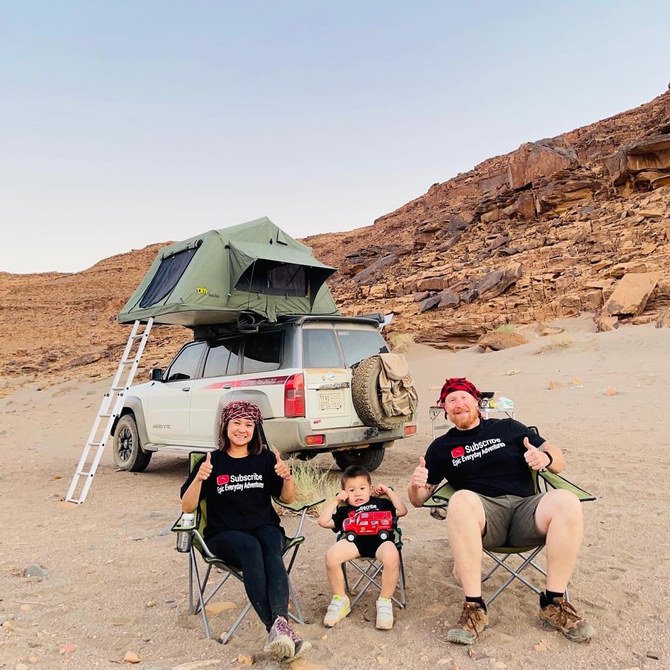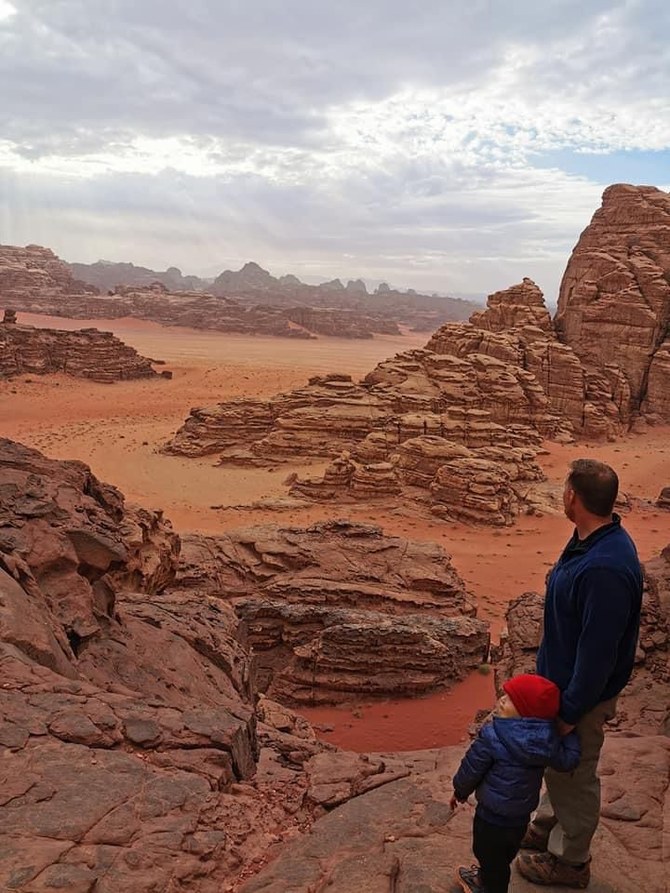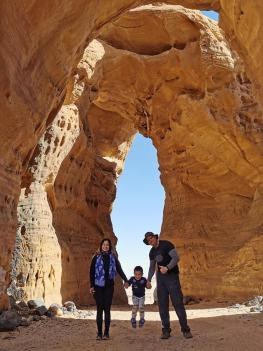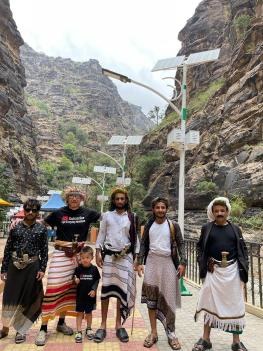JEDDAH: Intrepid expats Dale Shannon, his wife Jenny and their son Noah are on a mission to explore Saudi Arabia and reveal to the world the country’s natural beauty, incredible landscape and authentic culture.
They have been going on epic adventures that take them off the beaten track across the Kingdom for almost two years, sometimes alone and sometimes in the company of friends they describe as “a united team.”
They film their trips and experiences, and Jenny edits the footage to create entertaining travelogues that are uploaded to the couple’s YouTube channel, called Epic Everyday Adventures. Launched in August 2020, it now has more than 25,000 subscribers and has become particularly popular with Saudi viewers.
“We are so humbled to know how viewers have been inspired by our travels through some of the most remote parts of Saudi Arabia,” Dale told Arab News. “With more than 45 videos of adventures, we have seen families and individuals alike find inspiration and education through sharing our story and experiences.”
Dale, a US national who works in the aerospace industry as an aircraft mechanic and advisor, said he came to the Kingdom in 2015 to experience life in another country and grow as a person. Jenny, a nurse from the Philippines, came to work in Saudi Arabia in 2009. The couple married in 2016 and Noah, was born in Tabuk in 2017. They said they fell in love not only with each other but also their adopted country.
Dale said he comes from a small town in the US and grew up camping and hiking. Jenny, on the other hand, who grew up in a city and wanted to experience the great outdoors.
“Being outdoors and exploring nature really creates some positive character traits and memories, and we wanted to share and create our own experiences with Noah and give him an opportunity to grow up with those amazing outdoor adventures,” said Dale.
Along the way, he added, they have made some great friends.
“One of the things that makes Saudi Arabia really pull on our hearts is how easy it is to meet new people and become real friends,” said Dale. “People here really seem to genuinely care about each other and are some of the most welcoming people we have been fortunate enough to experience.
“One of the things we enjoy the most about our YouTube channel is how many awesome people we have been able to meet here in Saudi Arabia and establish personal relationships with.
“People here really seem to genuinely care about each other and are some of the most welcoming people we have been fortunate enough to experience.”
The idea for exploring the length and breadth of Saudi Arabia came to the couple about two years ago, after s trip to AlUla.
“We had gone on a tour to AlUla in early 2020, around February,” said Dale. “We enjoyed the scenery and the places and the desert so much that after that trip we knew that we wanted to continue and explore more. So, definitely our AlUla experience was the turning point that motivated and inspired us to explore more.”
Shannon had some vacation time saved up and Jenny, who was by then a stay-at-home mom, learned how to become a videographer and editor to produce their YouTube videos. They also invested in proper equipment and a new vehicle suitable for off-road exploring and began their adventure of a lifetime.
“After our AlUla trip, we bought some gear and changed our vehicle to a proper off-road exploring vehicle, a Nissan Patrol Super Safari, and we slowly started exploring the Kingdom.
“We fell in love with the landscapes, the open-air museum of history you find here and the hospitality and friendliness of the people of all areas … and then we started exploring. We just became naturally curious to see and know more.”
Venturing into the desert wilderness is not easy and requires a financial investment. As their videos grew in popularity the Shannons last year joined Patreon, a platform that provides content creators with the tools to build a subscription service for fans of their work. For the Shannons, it means that people who enjoy their videos can contribute toward the costs of creating future content. They said that about 70 percent of their supporters on Patreon are Saudi.
“We are so thankful for their support and hope to grow our small Patreon family so we can continue these adventures,” said Dale.
“It is expensive to take trips as much as we do. We don’t have any sponsors or anything like that, so up until recently we financed our own adventures so that we could continue sharing our experiences here in Saudi Arabia. We are thankful for the support of our small Patreon family.”
There have been some challenging moments during the family’s adventures, including a worrying incident during a journey through Al-Nafud Al-Kabir (The Great Desert) this month, when they were accompanied by other members of their team.
“We had prepared for this trip six months in advance,” said Dale. “This was the final leg of our overlanding trip. The terrain is difficult and full of sand dunes. We entered the desert just north of Hail and drove about 230km into the desert through the sand dunes. There was no cell service.
“We camped for three nights and drove for three days. The trip through the desert consumed most of our fuel and for some, all of their fuel.
“The stress you face and the quick decisions that have to be made are really challenging but, at the end of the day, it is so rewarding. I am happy our overlanding team trusted me enough to let me lead the expedition through Al-Nafud.”
His family has done so much traveling in the Kingdom during the past two years that Shannon said it is hard to keep count of their destinations.
“I am not exactly sure on the number of places we visited, but we drive everywhere we go and we have driven from Haql in the northwest all the way down to Fayfa in the south, and everywhere in between,” he said. “We have been from Hail down to Riyadh and in between. We hope to get enough time in the future to make it to the north and the east of the Kingdom.”
Wherever they have traveled in Saudi Arabia, Shannon said he has never felt concerned for the safety of his family.
“I mention this on many occasions in our videos because in comparison to most places I have been around the world, it’s extremely safe here and this is part of the reason we feel so comfortable exploring here,” he said.
In fact the most difficult aspect of the experience in Saudi Arabia so far has been language barrier.
“It would be really great to be able to learn Arabic,” he added.
Both Shannon and his wife said they adapted easily to life in Saudi Arabia after leaving their home countries behind.
“We found it to be quite easy transitioning to living in a foreign country,” he said. “I think part of the reason is because we had set our minds that this is what we wanted to do, but also because we both really fell in love with the people and the culture here in Saudi Arabia — those two things made the transition extremely easy.”
Asked if he had any advice for newcomers to the Kingdom or people considering moving there, Shannon said: “My advice to others moving to Saudi Arabia is always to come with an open mind, embrace the culture and the people, and once you arrive and settle in, go out there and meet people and get to know the people of Saudi Arabia. It will be one of the best things you have ever done.”








































